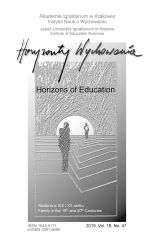Praca z rodziną biologiczną dziecka umieszczonego w pieczy zastępczej czynnikiem optymalizującym reintegrację rodziny
Work with the Biological Family of a Child Placed in Foster Care as a Factor Optimising Family Reintegration
Author(s): Lidia PietruszkaSubject(s): Education, Family and social welfare
Published by: Uniwersytet Ignatianum w Krakowie
Keywords: child; biological family; foster care; family reintegration;
Summary/Abstract: RESEARCH OBJECTIVE: The objective of the article is to attempt to synthetically present problem areas and issues related to work with the biological family of a child placed in a foster care institution, and to present this task as a current and urgent social need. THE RESEARCH PROBLEM AND METHODS: The problem question was posed as follows: what issues are taken into account in the pedagogical reflection on the importance of working with the biological family of a child placed in foster care? The article attempts to demonstrate the need to intensify and optimise this process. The method of literature analysis and content selection was used to obtain a synthesis of the discussed issues. THE PROCESS OF ARGUMENTATION: The realisation of the assumed goal and the answer to the formulated problem question is included in the conclusion process, which consists of: introducing the issue by analysing the basic assumptions of the child and family support system, and presenting the essence of the contact of the child placed in foster care with the biological family for the family reintegration process. RESEARCH RESULTS: Reflection on the addressed issues indicates the multifaceted nature of the presented area. The results of the data the article refers to indicate that the foster care system does not provide children with the expected degree of stable educational environment assumed in the legislation. Contrary to the adopted assumptions, only an unsatisfactory percentage of children who were placed in foster care are able to permanently leave the system before coming of age. CONCLUSIONS, INNOVATIONS, AND RECOMMENDATIONS: An urgent need was observed to prepare optimal models of support for families whose children are in foster care. In the face of new educational challenges, it also seems necessary to undertake the indispensable efforts towards the development of knowledge, skills and competences not only of social workers, but also of students of pedagogy and teaching degrees who should be prepared to undertake the necessary activities in working with the biological family and the child placed in foster care.
Journal: Horyzonty Wychowania
- Issue Year: 18/2019
- Issue No: 47
- Page Range: 117-128
- Page Count: 12
- Language: Polish

